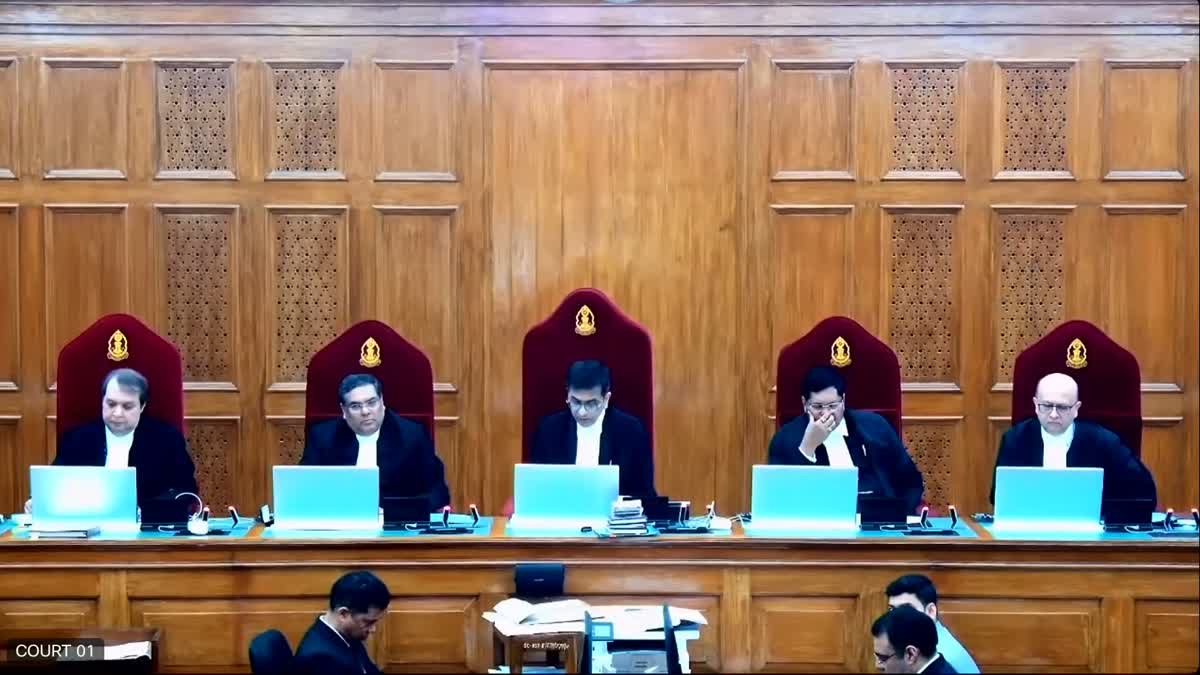New Delhi: A five-judge constitution bench on Thursday striking down the electoral bonds scheme ruled that information about funding to political parties is essential for electoral choices and the anonymous electoral bonds violate the right to Information and Section 19(1)(a).
A five-judge bench led by CJI D Y Chandrachud said the electoral bond scheme is violative of Article 19 (1) (a) and information about funding of political parties is essential for effective exercise of choice of voting.
The apex court said anonymous corporate contributions to political parties through electoral bonds violated the right to information of voters. However, the apex court said it is justified as it protects the right to privacy of contributors' political affiliation.
- " class="align-text-top noRightClick twitterSection" data="">
The bench also comprising Justices Sanjiv Khanna, BR Gavai, JB Pardiwala and Manoj Misra had on November 2, 2023 reserved its judgement after a three-day hearing. Justice Khanna delivered a separate judgement concurring with the majority judgement delivered by the CJI and justices Gavai, Pardiwala, and Misra.
Pronouncing the majority judgement, the CJI said not all political contributions are made with the intent to alter public policy and added that students, daily wagers etc also contribute. The CJI said to not grant an umbrella of privacy to political contributions only because some contributions are made for other purposes is not impermissible.
The CJI said the electoral bonds scheme has to be struck down as unconstitutional. CJI said the amendments to Income Tax Act and Representation of People Act on absolute non-disclosure of donations are struck down.
CJI said the information about corporate contributors through electoral bonds must be disclosed as the donations by companies are purely for quid pro quo purposes. The CJI said allowing corporations to make unlimited contributions to political parties violated a level playing field in polls.
The apex court asked the banks to forthwith stop issuing electoral bonds and asked SBI to provide all details of contributions made till date through the scheme to Election Commission by March 6. The commission will share the information on its website by March 13.
The Narendra Modi-led government notified the scheme on January 2, 2018, pitching it as an alternative to cash donations made to political parties. It was billed as an effort to bring in transparency in political funding.
The scheme provided for the political parties registered under Section 29A of the Representation of the People Act, 1951 to receive donations. To become eligible for donation, the said party should have polled at least 1 per cent of the votes in the last elections to the Lok Sabha or a State Legislative Assembly.
As per the provision, the bonds shall be encashed by an eligible political party only through an account with an authorised bank.
Electoral bonds are instruments in the nature of a promissory note or bearer bond which can be purchased by any individual, company, firm or association of persons provided the person or body is a citizen of India or incorporated or established in India. The bonds are issued specifically for the purpose of contribution of funds to political parties.
The methodology of the electoral bonds scheme is a "completely transparent" mode of political funding and it is impossible to get black money or unaccounted money pumped through this scheme, according to an affidavit the Centre filed before the Apex Court. Legal challenges were mounted by different petitioners before the top court, against the amendments made to different statutes of this scheme through Finance Act 2017 and Finance Act 2016. The petitioners say that the scheme had opened doors to unlimited, unchecked funding of political parties.
The petitioners wanted the top court to stay the issue of electoral bonds. Rejecting the request in April 2019, the Constitution bench said it will not stay the scheme, promising for an in-depth hearing on the pleas. It cited the Centre and the Election Commission raising "weighty issues" and that it would have a "tremendous bearing on the sanctity of the electoral process in the country".
The Constitution bench, also comprising Justices Sanjiv Khanna, B R Gavai, J B Pardiwala and Manoj Misra, had on October 31 last year commenced hearing arguments on the four petitions, including those filed by Congress leader Jaya Thakur, the Communist Party of India (Marxist), NGOs Association for Democratic Reforms (ADR) and Common Cause.
According to the civil society, the Finance Bill, 2017, paved the way for the introduction of the Electoral Bond scheme, was passed as a money bill even though it wasn't.



